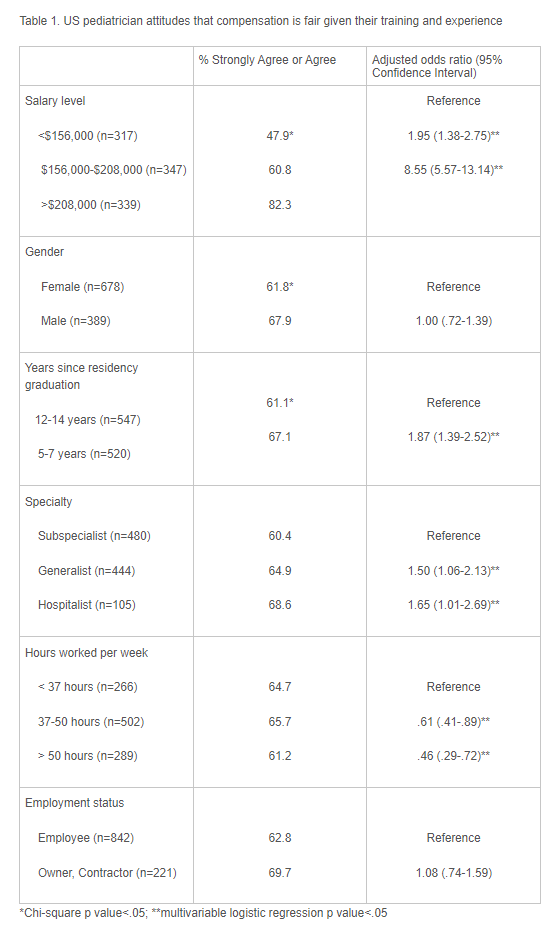Mary Pat Frintner, MSPH, Amanda Fisher, MS, Amy J Starmer, MD, MPH, Lynn Olson, PhD.
Presented at the 2017 Pediatric Academic Societies Annual Meeting.
Background: Previous reports on US physician compensation suggest that pediatricians are among the lowest paid specialty. Less is known about compensation perceptions and the degree of satisfaction with what pediatricians are earning.
Objective: Examine pediatrician income, attitudes on fairness of their compensation, and satisfaction with their compensation.
Methods: National, weighted data collected in 2016 from the AAP Pediatrician Life and Career Experience Study (PLACES), a longitudinal study of US pediatricians with 2 cohorts: 1) 5-7 yrs post-residency and 2) 12-14 yrs post-residency. ANOVA examined income by hours worked. Chi square tests and multivariable logistic regression examined relationships between attitudes that compensation is fair and pediatrician characteristics.
Results: 65% of PLACES pediatricians completed the 2016 surveys (n=1162); analyses included US pediatricians currently working in post-training positions (n=1070). Overall, mean reported income is $198,000, which varied by reported work hours per week (<37 hrs: $151,000; 37-50 hrs: $202,000; >50 hrs: $234,000, p<.001). In describing their basic compensation, 57% report a fixed salary, 27% a mix of salary and share of billings or other measures of performance, 8% a share of practice billings or workload, 5% time-based payment, and 4% other.
Overall, two-thirds believe that they are fairly compensated given their training and experience (64%). Half (54%) believe the methods used to calculate their compensation are fair and 68% understand how their compensation is calculated. In multivariable analysis, pediatricians who earn higher salaries, graduated from residency more recently, work as generalists or hospitalists, and work fewer hours are more likely to believe that they are fairly compensated, p<.05 (Table 1). The majority (52%) are earning what they expected upon leaving residency, while 29% are earning less and 19% are earning more than expected. About half report that they made sacrifices in their earned income for their children (47%) or in choosing pediatrics over another specialty (55%). Only one-third report that they are fairly compensated compared to physicians in other specialties (35%).
Conclusion: The majority of early to mid-career pediatricians are satisfied with their compensation in terms of their training and experience. Half believe the methods used to calculate their compensation are fair, while a third do not understand how their compensation is calculated or believe that their compensation is fair compared to physicians in other specialties.
